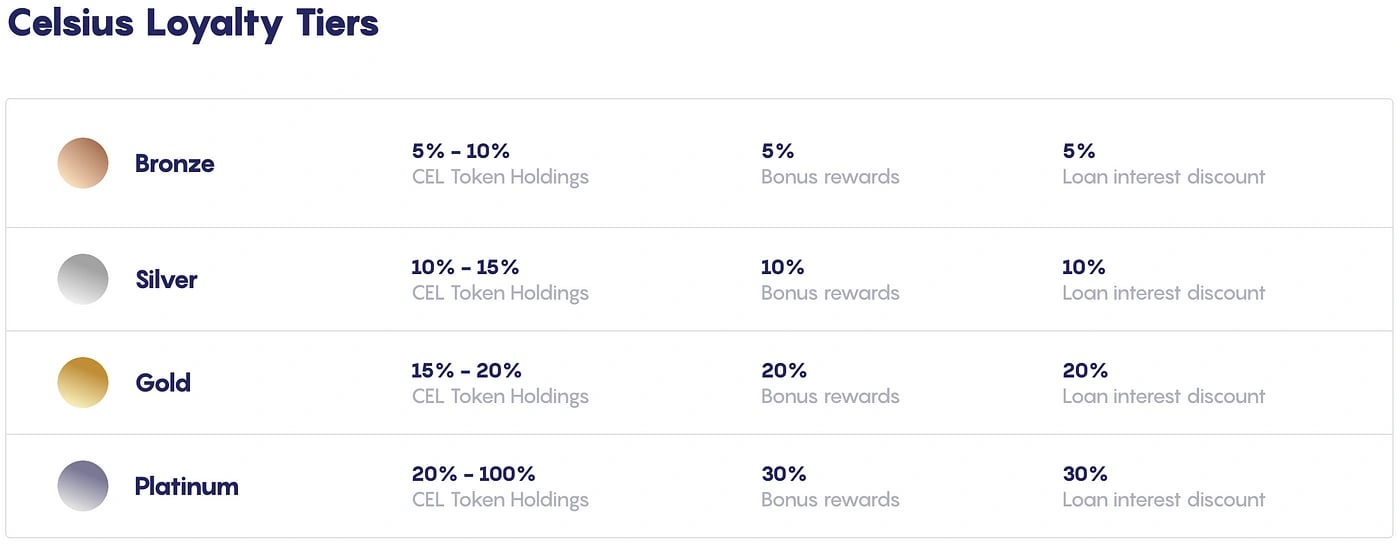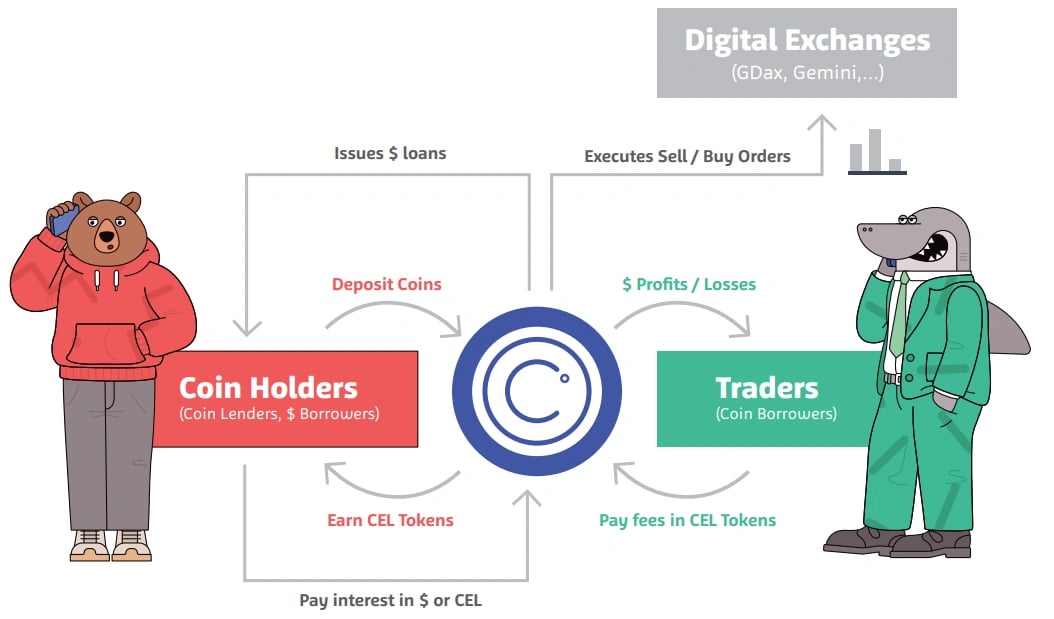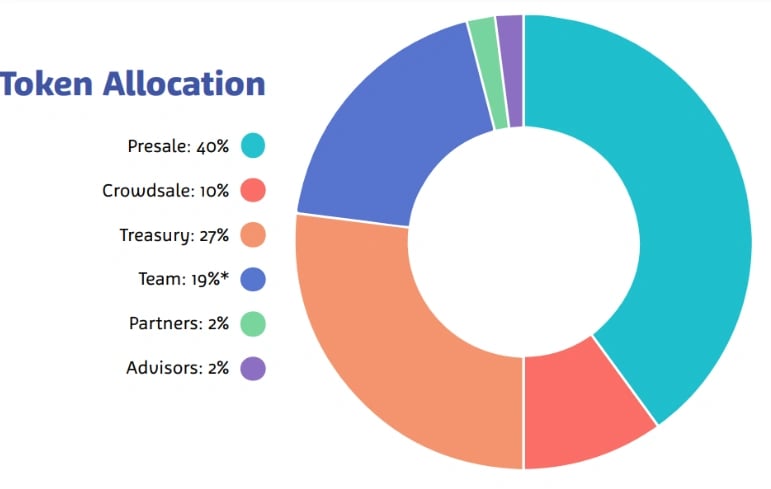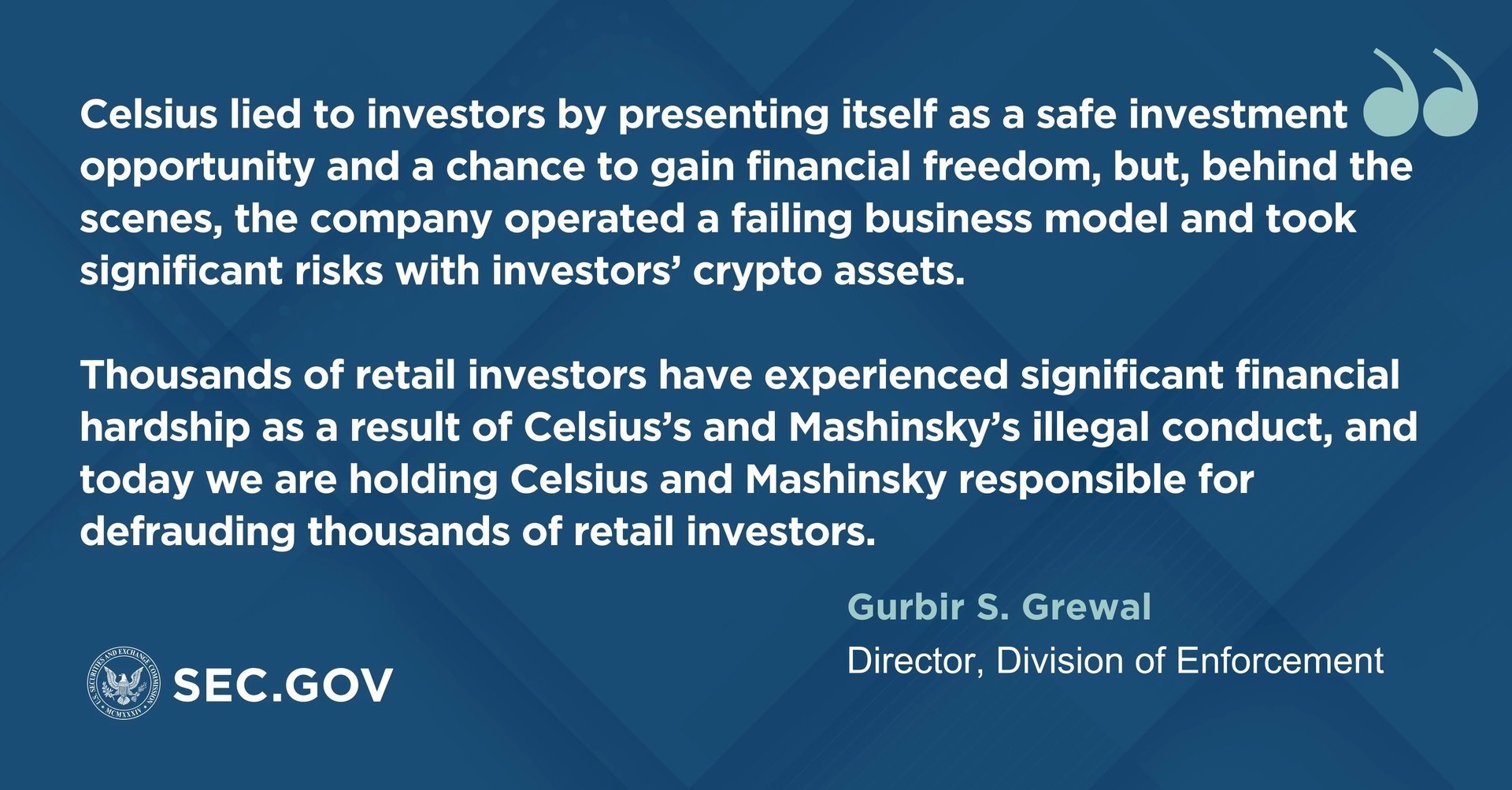위키 구독하기
Share wiki
Bookmark
Celsius Network
0%
Celsius Network
셀시우스 네트워크는 2022년 6월에 파산한 암호화폐 및 금융 대출 플랫폼이었습니다. 이 플랫폼은 이전에 암호화폐 보유자가 코인 형태로 자산에 대한 이자를 얻거나 회사의 CEL 토큰을 사용하여 암호화폐를 담보로 현금 대출을 받을 수 있도록 했습니다. [1]
개요
Celsius Network는 2017년에 설립되어 런던에 본사를 두고 있으며, ERC-20 토큰인 CEL을 이더리움 블록체인에서 활용하여 거래소를 위한 지갑을 제공하고, 코인 대출 및 차용에 대해 기존 금융 기관보다 낮은 금리를 제공했습니다. 그들의 목표는 암호화폐를 대출하여 수익을 얻을 수 있는 코인 보유자로 대형 은행과 선물 거래소를 대체하는 것이었습니다. [3][9]
또한, 네트워크는 플랫폼의 지갑 UI를 통해 사용자가 자산을 관리하고 CelPay를 활용할 수 있는 플랫폼을 제공했습니다. 차용 옵션은 비교적 낮은 금리로 암호화폐 담보 대출을 허용했습니다. 사용자는 주간 보상, 프로모션 코드 및 추천 인센티브를 통해 혜택을 받을 수 있었습니다. Celsius의 DeFi 부문인 CelsiusX는 중앙 집중식 금융과 탈중앙화 금융의 융합을 제공했으며 개발자는 Celsius API 포털을 사용할 수 있었습니다. [22]
CelPay
CelPay는 Celsius 앱 내의 기능으로 암호화폐 결제를 간소화하기 위해 만들어졌습니다. 사용자는 앱을 통해 연락처로 디지털 자산을 보내거나, 수신자가 인증된 지갑을 만든 후 코인을 수령할 수 있는 링크를 공유할 수 있었습니다. 거래에는 이메일 확인이 필요했으며, 보안을 위해 일일 거래 한도는 $2500였습니다. [23]
CelsiusX
Celsius Network의 탈중앙화 금융(DeFi) 부문인 CelsiusX는 중앙 집중식 금융(CeFi)과 DeFi 간의 다리 역할을 했습니다. 블록체인 간 자산 이동을 용이하게 하여 상호 운용성을 촉진했습니다. CelsiusX는 CeFi 대출을 DeFi로 확장하여 사용자에게 두 금융 패러다임의 이점을 제공했습니다. [24]
CEL 토큰
CEL 토큰은 2018년에 5천만 달러 이상을 모금한 토큰 판매를 통해 도입되었으며, Celsius 플랫폼 서비스에 대한 접근 권한을 부여하는 유틸리티 토큰 역할을 했습니다. [4]
셀시우스 로열티 보상
셀시우스 네트워크는 CEL 토큰 보유량에 따라 4단계로 구성된 로열티 보상 시스템을 운영했습니다. 보상은 시장 상황과 지갑 사용량에 따라 변동되었습니다. 높은 등급일수록 보너스 이자와 대출 이자 할인을 제공했으며, 플래티넘 등급에서는 각각 최대 35%와 30%까지 할인이 적용되었습니다. [5][11]

CEL 토큰 유틸리티
CEL 토큰을 보유하면 Celsius 앱 내에서 달러 대출 요청 우선권, 낮은 대출 이자율(최대 30% 할인), 코인 대출 이자율 감소, CEL 토큰으로 주간 이자를 받는 경우 더 높은 이자율(최대 35%)과 같은 혜택이 제공되었습니다. 상위 보유자는 독점적인 특전을 받았습니다. [6][10]
토큰 경제학
CEL 토큰 보유자는 기관 트레이더가 수수료로 CEL 토큰을 사용하여 발생한 이자로부터 보상을 받았습니다. Celsius는 비영리로 운영되어 대부분의 자금을 커뮤니티에 다시 분배했습니다. [10]

토큰 할당

역사
Initial Coin Offering (ICO)
2018년 5월, Celsius는 Initial Coin Offering (ICO)를 실시하여 총 토큰 공급량의 약 절반에 해당하는 3억 2,500만 개의 CEL 토큰을 판매하여 5천만 달러를 모금했습니다. 구매 시 토큰 보유자는 플랫폼의 "대출" 기능을 통해 이자로 CEL 토큰을 얻을 수 있었습니다. [12][13]
지분형 크라우드 펀딩
2020년 8월, Celsius Network는 지분형 크라우드 펀딩을 통해 2천만 달러 이상을 모금했습니다. 이 크라우드 펀딩 캠페인은 1,000명 이상의 투자자를 유치했으며 여러 차례 연장되었습니다. 초기 목표인 1천만~1천5백만 달러를 초과했으며, Tether가 모금액에 1천만 달러를 기부했습니다. Alex Mashinsky는 더 많은 투자자가 제안에 참여할 수 있도록 연장을 발표했습니다. [8]
파산
파산 신청
2022년 7월, 유동성 위기에 직면한 Celsius Network는 미국 뉴욕 남부 지방 법원에 챕터 11 파산 보호를 신청하기로 결정했습니다. 이 회사의 조치는 사업을 안정화하고 고객의 이익을 보호하기 위해 플랫폼에서 인출, 스왑 및 이전을 일시적으로 중단한 데 따른 것입니다. 이러한 전략적 중단은 조기 인출로 인해 특정 고객이 불이익을 당하는 것을 방지하고, 다른 고객이 회수를 받기 전에 장기 자산 배치 활동에서 가치 창출이 완료되기를 기다리도록 하기 위한 것입니다. [25]
Celsius에 대한 판사의 판결
2023년 1월, 연방 파산 판사는 Celsius Network의 고금리 Earn 프로그램에 예치된 암호화폐에 대한 소유권 주장에 대해 Celsius Network의 손을 들어주었습니다. 이 프로그램은 사용자가 비트코인, 이더리움, 테더와 같은 암호화폐를 예치하고 주간 이자를 받을 수 있도록 했습니다. 법원의 결정에 따라 스테이블코인을 포함한 Earn 계정에 예치된 자산은 Celsius Network의 자산이 되었으며, 이는 플랫폼의 명확한 약관에 영향을 받은 판결입니다. [26]
파산 종료를 위한 합의
2023년 7월 20일, Celsius Network는 782억 달러 규모의 무담보 채권을 해결하는 중요한 합의를 이루어 고객에게 자산을 반환하고 궁극적으로 파산 절차를 종료할 수 있게 되었습니다. Martin Glenn 판사의 평가를 받아야 하고 8월 3일까지 답변을 받을 수 있는 이 합의에는 고객 회수율을 5% 향상시키고 Earn 프로그램 참가자를 위한 해결책을 제공하는 조치가 포함되었습니다. 이러한 진전은 Celsius Network가 어려움을 극복하고 신뢰를 재건하며 파산 후 비전을 발전시키기 위한 헌신을 강조했습니다. [27]
법적 분쟁
폰지 사기 혐의
2022년 11월, 셀시우스 네트워크는 전 투자 매니저 제이슨 스톤으로부터 암호화폐 대출 플랫폼이 사기 행위에 가담하고 폰지 사기로 운영되었다는 혐의로 소송을 당했습니다. 스톤은 셀시우스가 자체 디지털 코인의 가격을 인위적으로 부풀리고, 적절한 위험 관리 전략을 시행하지 않았으며, 고객 예금을 사용하여 토큰 가치를 조작했다고 주장했습니다. 소송은 셀시우스 CEO인 알렉스 마신스키가 예금자들을 희생시키면서 사익을 추구했다고 주장했습니다. [14][15]
스톤은 또한 셀시우스가 거래 위험에 대한 헤지를 하지 않았고 암호화폐 이더리움으로 표시된 상당한 부채를 보유하고 있었지만 이를 충당할 충분한 보유량이 없었다고 주장했습니다. 그 결과, 고객이 예금을 인출하려고 시도했을 때 셀시우스는 높은 가격으로 더 많은 이더를 구매해야 했고 막대한 손실을 입었습니다. 소송은 셀시우스가 새로운 예금자를 유치하고 초기 투자자에게 상환하기 위해 두 자릿수 이자율을 제공하는 데 의존하여 회사를 폰지 사기로 특징지었다고 비난했습니다. [14][15]
셀시우스는 유동성 위기와 사용자들을 위한 일시적인 인출 중단으로 인해 추가적인 조사를 받았습니다. 스톤이 2021년 3월 셀시우스를 떠난 것은 회사의 설명되지 않은 1억 달러에서 2억 달러의 대차대조표 구멍 때문이었다고 합니다. 소송은 셀시우스가 이더리움 지갑을 계속 통제했으며, CEO가 귀중한 대체 불가능한 토큰을 아내의 지갑으로 이전하는 것을 포함하여 개인적인 이익을 위해 사용했다고 주장했습니다. [14][15]
Celsius 및 Mashinsky에 대한 소송
2023년 7월 13일, 미국 법무부(DOJ), 증권거래위원회(SEC), 연방거래위원회(FTC) 및 상품선물거래위원회(CFTC)를 포함한 다양한 연방 기관에서 제기한 일련의 소송이 있었습니다. 이러한 법적 조치는 Celsius Network라는 회사와 전 CEO인 Alex Mashinsky를 모두 대상으로 했습니다. [16]
미국 법무부 (DOJ) 소송
2023년 7월 13일, DOJ는 마신스키를 고객 사기 및 4,200만 달러 횡령 혐의로 형사 고발했습니다. 기소장에 따르면 마신스키와 다른 Celsius 임원들은 Celsius의 자체 토큰인 CEL의 가치를 부풀려 판매 이익을 얻기 위한 계획을 세웠습니다. 마신스키와 그의 동료인 전 최고 수익 책임자 로니 코헨-파본은 이러한 범죄 행위와 관련하여 기소되었습니다. [16][17]
오늘 저는 Celsius의 창립자이자 CEO인 알렉스 마신스키가 Celsius 플랫폼의 기본적인 안전과 보안에 대한 일련의 허위 주장을 통해 Celsius 고객을 사취하는 계획을 세우고 Celsius의 최고 수익 책임자인 로니 코헨-파본과 함께 Celsius의 독점 토큰인 CEL의 가격을 부풀리는 계획에 참여한 혐의로 기소된 기소장을 공개합니다. - 미국 변호사 데미안 윌리엄스
증권거래위원회 (SEC) 소송
2023년 7월 14일, SEC는 Celsius Network와 Mashinsky를 상대로 소송을 제기하여 회사가 플랫폼의 안전성에 대해 고객에게 반복적으로 거짓말을 했다고 주장했습니다. SEC는 Celsius가 규제 승인에 대해 허위 진술을 하고, 사용자 기반을 허위로 표시하고, 시장 조작에 관여했다고 주장했습니다. 또한 Celsius가 대출 프로그램을 통해 미등록 증권을 제공하고 판매했다고 비난했습니다. [16][18]

미국 연방거래위원회 (FTC) 소송
2023년 7월 13일, FTC는 Celsius가 소비자들을 속여 자산을 예치하도록 유도하고 투자를 부실하게 관리했다고 비난했습니다. FTC는 Celsius가 투자자들에게 거짓말을 하고, 인출에 필요한 충분한 유동 자산을 유지하지 못했으며, 스스로를 전통적인 은행의 안전한 대안으로 허위 광고했다고 주장했습니다. 소송에는 Celsius Network뿐만 아니라 공동 창업자인 Shlomi Daniel Leon과 Hanoch "Nuke" Goldstein도 포함되었습니다. [16][19]
“Celsius는 새로운 비즈니스 모델을 내세웠지만 구식 사기를 저질렀습니다. 오늘 Celsius의 자금 취급 금지 조치와 경영진에 대한 책임 추궁은 신기술이 법 위에 있지 않다는 것을 분명히 해야 합니다.” - Samuel Levine, FTC 소비자 보호국 국장.
상품선물거래위원회(CFTC) 소송
CFTC는 마신스키와 셀시우스 네트워크를 셀시우스의 디지털 자산 기반 금융 플랫폼 운영과 관련된 사기 및 중대한 허위 진술 혐의로 기소했습니다. CFTC는 셀시우스가 고객에게 허위 진술을 하고 회사의 레버리지에 대해 속였다고 주장했습니다. 마신스키는 특히 셀시우스 고위 경영진으로부터 오해의 소지가 있는 진술을 중단하라는 경고를 받았습니다. [16][20]
결과 및 합의
이러한 소송의 결과로 알렉산더 마신스키는 체포되어 형사 고발을 당했고, 셀시우스 네트워크와 그 계열사는 벌금, 과태료 및 금지 조치를 받았습니다. 마신스키는 사기 및 CEL 토큰 조작 혐의에 대해 무죄를 주장했습니다. 체포 후 미국 지방 판사는 마신스키의 보석금을 4천만 달러로 책정했습니다. 보석 합의의 일환으로 그는 여행이 제한되었고 새로운 은행 또는 암호화폐 계좌를 개설하는 것이 금지되었습니다. 마신스키의 아내는 채권을 서명했고, 채권은 그의 뉴욕시 집과 은행 계좌에 대한 재정적 청구로 확보되었습니다. 마신스키와 다른 임원들에 대한 공조된 법적 조치는 법무부, 연방거래위원회, 연방 증권 및 상품 규제 기관에 의해 발표되었습니다. 마신스키의 변호사들은 그가 혐의를 부인하고 법정에서 자신을 변호하기를 고대한다고 밝혔습니다. [21]
Celsius 운영 중단
2023년 8월 9일, Celsius는 공개 성명서를 통해 신고일로부터 90일 이내에 운영을 중단할 것이라고 밝혔습니다. "NewCo"라는 새로운 법인이 인수하며, Fahrenheit Group이 관리하고 Celsius 채권자들이 소유하게 됩니다. 사용자는 90일 인출 기간이 만료된 후에는 Celsius 계정에 액세스할 수 없게 됩니다. 그러나 Celsius는 파트너 프로그램 및 기타 거래소를 통해 보상을 받은 사람들을 포함하여 채권자에게 상환할 계획입니다. 이러한 상황 이후, 암호화폐 컨소시엄인 Fahrenheit LLC가 Celsius 인수를 위해 20억 달러의 입찰에 참여하여 낙찰되었습니다. 이들은 가격 변동에 따라 최소 20억 3천만 달러 상당의 암호화폐를 채권자에게 배포하는 것을 목표로 하며, 미국 채권자를 위해 Paypal과 같은 제3자 배포 에이전트를 사용합니다. [28][29][30]
잘못된 내용이 있나요?
